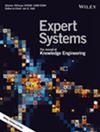Autism spectrum disorder identification using multi‐model deep ensemble classifier with transfer learning
IF 3
4区 计算机科学
Q2 COMPUTER SCIENCE, ARTIFICIAL INTELLIGENCE
引用次数: 0
Abstract
Identifying autism spectrum disorder (ASD) symptoms accurately is a challenging task. The traditional subjective diagnostic process of ASD relies on time‐consuming behavioural and psychological observations. In this study, we introduce an ensemble learning‐based classification model using an open‐access database focusing on functional magnetic resonance imaging (fMRI). We propose a novel multi‐model ensemble classifier (MMEC) and multisite ensemble classifier (MSEC) with transfer learning (TL) for ASD classification to improve the prediction accuracy. The MMEC utilizes four base classifiers, Inception V3, ResNet50, MobileNet, and DenseNet to boost the performance of the individual convolutional neural network (CNN) models. The MSEC combined the base classifiers trained from different data sites. We evaluate the two models with ensemble averaging, weighted averaging, and stacking methods. The proposed MMEC with stacking shows the state of art performance compared to MSEC, improving the prediction accuracy by 3.25%. The obtained results have shown an accuracy of 97.82%, 97.82%, and 97.78% for ensemble averaging, weighted averaging, and stacking methods, respectively, on multi‐site datasets. The ensemble classifier MMEC performed better than a single classifier on the multi‐site dataset. The proposed MMEC opens a new paradigm to design a universal ASD classification framework.利用多模型深度集合分类器和迁移学习识别自闭症谱系障碍
准确识别自闭症谱系障碍(ASD)症状是一项具有挑战性的任务。传统的自闭症主观诊断过程依赖于耗时的行为和心理观察。在本研究中,我们利用一个以功能磁共振成像(fMRI)为重点的开放数据库,引入了一种基于集合学习的分类模型。我们提出了一种新型多模型集合分类器(MMEC)和带有迁移学习(TL)的多站点集合分类器(MSEC),用于 ASD 分类,以提高预测准确率。MMEC利用Inception V3、ResNet50、MobileNet和DenseNet四个基础分类器来提高单个卷积神经网络(CNN)模型的性能。MSEC 结合了从不同数据站点训练的基础分类器。我们用集合平均法、加权平均法和堆叠法对这两种模型进行了评估。与 MSEC 相比,建议的叠加 MMEC 表现出了最先进的性能,预测准确率提高了 3.25%。所获得的结果显示,在多站点数据集上,集合平均法、加权平均法和堆叠法的准确率分别为 97.82%、97.82% 和 97.78%。在多站点数据集上,集合分类器 MMEC 的表现优于单一分类器。所提出的 MMEC 为设计通用的 ASD 分类框架开辟了新的范式。
本文章由计算机程序翻译,如有差异,请以英文原文为准。
求助全文
约1分钟内获得全文
求助全文
来源期刊

Expert Systems
工程技术-计算机:理论方法
CiteScore
7.40
自引率
6.10%
发文量
266
审稿时长
24 months
期刊介绍:
Expert Systems: The Journal of Knowledge Engineering publishes papers dealing with all aspects of knowledge engineering, including individual methods and techniques in knowledge acquisition and representation, and their application in the construction of systems – including expert systems – based thereon. Detailed scientific evaluation is an essential part of any paper.
As well as traditional application areas, such as Software and Requirements Engineering, Human-Computer Interaction, and Artificial Intelligence, we are aiming at the new and growing markets for these technologies, such as Business, Economy, Market Research, and Medical and Health Care. The shift towards this new focus will be marked by a series of special issues covering hot and emergent topics.
 求助内容:
求助内容: 应助结果提醒方式:
应助结果提醒方式:


